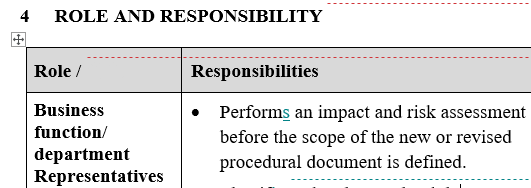In a table like R&R, the subject is given in a column while the "Actions" are given in another column. See 1st picture attached. The reviewer corrected me that all verbs shall start with singular. However, the verb "be" is not corrected as "is" (see 2nd picture). So may I seek your advice on this question? Shall the verb in the separate column start with singular or plural? Does the subject itself (singular or plural) have effect on the verb? Thank you!
2 Answers
Fairly straightforwardly, if you're describing a task in terms of what a particular person, function or role actually does in the company, you'll use the third person singular, but if you prefer to write as if you're describing a responsibility ascribed to a particular person, role or function, you should use the infinitive (with or without 'to').
If your table is for internal purposes only, it may not be all that important to be consistent about this, but if you want it to look polished, you should iron any inconsistencies out.
Personally, under the title "Responsibilities" I'd tend to use an infinitive with 'to', as in (say) "It is the Testing manager's responsibility to set up the testing environment and maintain it in good order," but that's a matter of personal preference.
My preference:
- Role: Software tester[s]
- Responsibilities: to step through each use case and record any unexpected behaviour in the error log.
To keep the linguistic logic tidy, I'd avoid structures like "[to] be responsible for [doing something]" (as in your image above), as it duplicates the meaning of the heading "Responsibilities".
An alternative to the above example:
- Role: Software tester
- Responsibilities: steps through each use case and record any unexpected behaviour in the error log
or (assuming there are several software testers and you want to make that clear in your grammar):
- Role: Software testers
- Responsibilities: step through each use case and record any unexpected behaviour in the error log
I'd tend to start all such descriptions with a lower case letter, but that too is a matter of personal preference.
In my experience, total consistency in grammar is both relatively unimportant and fairly rare in purely operational documents that are not used for presentation purposes to clients or partners. Having said that, if something is worth doing, it doesn't cost much to do it properly.
And if a reviewer wants you to use a particular structure consistently, it seems sensible to do their bidding unless you have some pressing reason not to.
To avoid confusion, avoid inconsistency in your nomenclature (even to prevent what might seem like inelegant repetition): a 'subject' is not the same thing as a 'role' and an 'action' is very much not the same thing as a 'responsibility'.
One last thing: try to be consistent in how you punctuate the title of each role. If you use "Software Manager" for one role, don't use "Software tester" for another, and vice versa.
Using the third person is pretty common in such tables. If the table applies to one person, then use the singular, and if it applies to multiple people, then use the plural. You can also head all of the phrases with bare infinitives, especially if you don't know whether the table applies to one person or multiple people.
In any case, the rows should certainly be consistent. Thus:
With third person singular: "performs" and "is"
With third person plural: "perform" and "are"
With bare infinitive: "perform" and "be"
By the way, your question mentions that "subject" and "actions" are given in columns, but I don't see those terms in either of the attached pictures.
-
Thank You very much! That's most helpful. The "subject" is in the column "Role" at left, e.g., in the first row it's "Representatives" which mostly will not be just 1 person. The second row is "Document Owner (sorry the 2nd word is not included in the snapshot)", mostly it's 1 designated person. OK, shall i say I can always choose "Bare infinitive" format of the verbs irrespective the third person will be singular or plural? Commented Jan 6, 2022 at 8:49
-
1@Chilltown I'd say that in your examples the verbs in question are not tensed singular forms, but plain (i.e. infinitive) forms as used in imperative clauses.– BillJCommented Jan 6, 2022 at 10:28
-
@Chilltown Yes, I don't think that anybody would object to the use of the bare (plain) infinitives in a situation like this. Commented Jan 6, 2022 at 23:53
-


